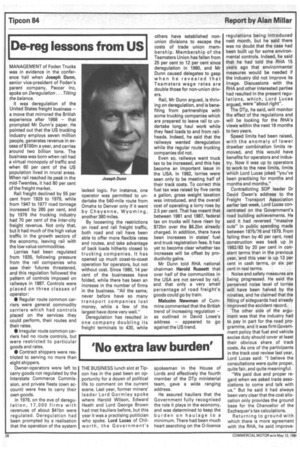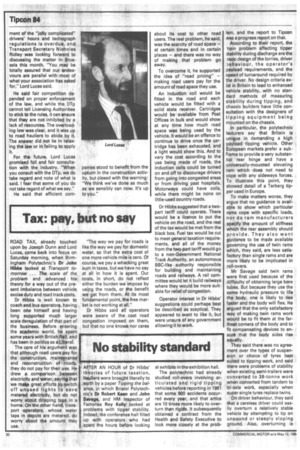De-reg lessons from US
Page 30

Page 32

If you've noticed an error in this article please click here to report it so we can fix it.
MANAGEMENT of Foden Trucks was in evidence in the conference hall when Joseph Dunn, senior vice-president of Foden's parent company, Paccar Inc, spoke on Deregulation . . Tilting the balance.
It was deregulation of the United States freight business — a move that mirrored the British experience after 1968 — that prompted Mr Dunn's paper. He pointed out that the US trucking industry employs seven million people, generates revenue in excess of $100m a year, and carries around two billion tone. The business was born when rail had a virtual monopoly of traffic and when 60 per cent of the US population lived in nrural areas. When rail reached its peak in the mid-Twenties, it had 80 per cent of the freight market.
Rail freight declined by 55 per cent from 1929 to 1979, while from 1947 to 1977 road tonnage increased by 285 per cent, and by 1976 the trucking industry had 70 per cent of the inter-city freight revenue. Not only that, but it had much of the high value traffic in the growth sectors of the economy, leaving rail with the low value commodities.
Lorries had been regulated from 1935, following pressure from the rail companies who saw their futures threatened, and this regulation followed the pattern of controls imposed on railways in 1887. Controls were placed on three classes of operator: • Regular route common carriers were general commodity carriers which had controls placed on the services they could perform, their routes and their rates.
• Irregular route common carriers had no route controls, but were restricted to particular goods and rates.
• Contract shippers were restricted to serving no more than eight shippers.
Owner-operators were left to carry goods not regulated by the Interstate Commerce Commission, and private fleets (own account) were free to carry their own goods.
In 1979, on the eve of deregulation, 1 7,0 00 firms with revenues of about $41bn were regulated. Deregulation had been prompted by a realisation that the operation of the system lacked logic. For instance, one operator was permitted to undertake the 540-mile route from Omaha to Denver only if it went by Cheyenne, Wyoming, another 360 miles.
By loosening the restrictions on road and rail freight traffic, both road and rail have been able to offer more flexible rates and routes, and take advantage of back loads hitherto closed to trucking companies. It has opened up much coast-to-coast operation for operators, but not without cost. Since 1980, 14 per cent of the businesses have folded, while there has been an increase in the number of firms in the business. "All the same, never before have so many transport companies lost money, while a few of the largest have done very well."
Deregulation has resulted in one company doubling its freight terminals to 430, while THE BUSINESS lunch slot at Tipcon has in the past been an opportunity for a doyen of political life to comment on the current scene. Last year, former miners' leader Lord Gormley spoke where Harold Wilson, Edward Heath and Lord George Brown had met hauliers before, but this year it was a practising politician who spoke. Lord Lucas of Chilworth, the Government's others have established nonunion divisions to escape the costs of trade union membership. Membership of the Teamsters Union has fallen from 25 per cent to 12 per cent since deregulation in 1980, and Mr Dunn caused delegates to gasp when he revealed that Teamsters wage rates are double those for non-union drivers.
Rail, Mr Dunn argued, is thriving on deregulation, and is benefiting from partnerships with some trucking companies which are prepared to leave rail to undertake long haul work while they feed loads to and from railheads. Indeed, he said that the railways wanted deregulation while the regular route trucking companies did not.
Even so, railways want truck tax to be increased, and this has become an important issue in the USA. In 1982, lorries were seen only to be meeting half of their track costs. To correct this fuel tax was raised by five cents a gallon, gross weight taxation was introduced, and the overall cost of operating a lorry rose by 2.5 per cent. That has meant that between 1981 and 1987, federal tax on trucks will have risen by $72bn over the $6.2bn already charged. In addition, there have been increases in states' fuel and truck registration fees. It has yet to become clear whether tax increases will be offset by productivity gains.
Mr Dunn told RHA national chairman Harold Hussett that over half of the communities in the USA are not served by rail, and that only a very small percentage of road freight's goods could go by train.
Malcolm Newman of Cummins commented that the British trend of increasing regulation — as outlined in David Lowe's address — appeared to go against the US trend.
spokesman in the House of Lords and effectively the fourth member of the DTp ministerial team, gave a wide ranging address.
He assured hauliers that the Government fully recognised the role it plays in the economy, and was determined to keep the burden on haulage to a minimum. There had been much heart searching on the 0-licence regulations being introduced next month, but he said there was no doubt that the case had been built up for some environmental controls. Indeed, he said that he had told the RHA 15 years ago that environmental measures would be needed if the industry did not improve its image. Discussions with the RHA and other interested parties had resulted in the present regulations, which, Lord Lucas argued, were "about right".
The DTp, he said, will monitor the effect of the regulations and will be looking for the RHA's views within the next 18 months to two years.
Speed limits had been raised, with the anomaly of lower drawbar combination limits removed, and this would have benefits for operators and industry. Now it was up to operators to work to the new limits, limits which Lord Lucas joked "you've been practising for months and months and months."
Contradicting SDP leader Dr David Owen's address to the Freight Transport Association earlier last week, Lord Lucas concentrated on the Government's road building achievements. He said it had reversed "massive cuts" in public spending made between 1975/76 and 1979. From falling then by 40 per cent, road construction was back up in 1982/83 by 20 per cent in constant terms than in the previous year, and this year is up 13 per cent in cash terms, or six per cent in real terms.
Noise and safety measures are being progressed. He said the perceived noise level of lorries will have been halved by the nineties, and he claimed that the fitting of sideguards had already improved the accident record.
The other side of the argument was that the industry had to pay in part for the road programme, and it was firm Government policy that fuel and vehicle excise duty should cover at least their obvious share of track costs. As one of the participants in the track cost review last year, Lord Lucas said: "I believe the consultations were quite proper, quite fair, and quite meaningful.
"We paid due and proper regard when we asked trade associations to come and talk with us." But he said it had always been very clear that the cost allocation only provides the ground base for the Chancellor of the Exchequer's tax calculations.
Returning to ground with which there is more agreement with the RHA, he said improve ment of the "jolly complicated" drivers' hours and tachograph regulations is overdue, and Transport Secretary Nicholas Ridley was looking forward to discussing the matter in Brussels this month. "You may be totally assured that our endeavours are parallel with most of what your association has asked for," Lord Lucas said.
He said fair competition depended on proper enforcement of the law, and while the DTp cannot tell Licensing Authorities to stick to the rules, it can ensure that they are not inhibited by a lack of resources. The overloading law was clear, and it was up to road hauliers to abide by it. The answer did not lie in relaxing the taw or in failing to apply it.
For the future, Lord Lucas promised full and fair consultation with the industry. "When you consult with the DTp, we do take regard and note of what is said. I fear that some of you do not take regard of what we say."
He said that efficient corn panies stood to benefit from the upturn in the construction activity, but closed with the warning: "We think we've done as much as we sensibly can now. It's up to you." about its cost to other road users. The real problem, he said, was the scarcity of road space — at certain times and in certain places — and there was no way of making that problem go away.
To overcome it, he supported the idea of "road pricing" — making road users pay for the amount of road space they use.
An induction coil would be fitted in the road and each vehicle would be fitted with a solid state receiver. Cartridges would be available from Post Offices in bulk and would show at any time how much road space was being used by the vehicle. It would be an offence to continue to drive once the cartridge has been exhausted, and a light would show this. And to vary the cost according to the use being made of roads, the induction coils could be turned on and off to discourage drivers from going into congested areas or from driving past hospitals. Motorways could have coils, while there might be none on little-used country roads.
Dr Hibbs suggested that a twopart tariff could operate. There would be a licence to put the vehicle on the road, and the rest of the tax would be met from the black box. Fuel tax would be cut to meet general taxation requirements, and all of the money from the two-part tariff would go to a non-Government National Track Authority, an autonomous BBC-like authority responsible for building and maintaining roads and railways. A rail committee would let it build railways where they would be more suitable for relief of congestion.
Operator interest in Dr Hibbs' suggestions could perhaps best be described as sceptical. They appeared to want to like it, but were unsure of any government allowing it to work.












































































































